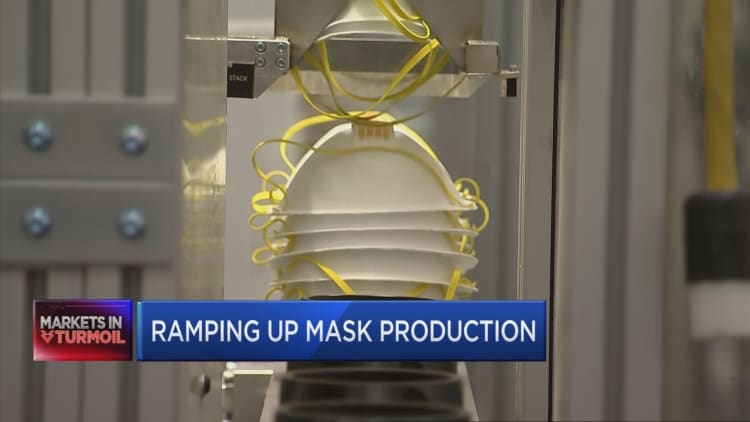With close contact, crowded spaces, heavy breathing and frequently-touched equipment, the gym might seem like a minefield for coronavirus infection.
Coronavirus, aka "COVID-19," is believed to spread through inhaling respiratory droplets that are released when an infected person sneezes or coughs, or from touching an infected surface and then touching your eyes, nose or mouth. As of Friday, there are more than 101,000 cases in 88 countries around the globe, according to data compiled by the World Health Organization. And in the United States, there are at least 260 confirmed cases and 14 deaths in 19 states, according to the Centers for Disease Control.
As schools and offices close to prevent the virus from spreading, does that mean you should skip your workout class or gym session?
It depends where you live, Aubree Gordon, associate professor of epidemiology at the University of Michigan's School of Public Health tells CNBC Make It.
If there's a COVID-19 outbreak in your area, there could certainly be a risk of contracting it at the gym, so it might be a good idea not to go, Gordon says.
For example, in Washington state there are 79 confirmed cases of COVID-19 and 11 deaths in the Seattle area, as of Friday. In California, there are 66 confirmed cases of COVID-19, and one death as of Wednesday, when Gov. Gavin Newsom declared a state of emergency. In New York state, there are 22 reported cases as of Friday.
Other states, such as Arizona, Colorado, Florida, Georgia, Illinois, Massachusetts, Nevada, New Hampshire, North Carolina, Oregon, Rhode Island, Tennessee, Texas and Wisconsin have fewer cases, according to the CDC.
But even if there are no cases of COVID-19 where you live, "it still might be prudent to take some normal precautions," Gordon says.
Of course that includes washing your hands for 20 seconds with soap and water, not touching your face, covering your cough or sneeze and staying home when you're sick. Or you could work out at home.
"At this point, people should certainly keep exercising," Gordon says. In fact, physical activity can boost your immune system, Michael Knight, assistant professor of medicine at the George Washington School of Medicine and Health Services, tells CNBC Make It. "I would encourage my patients to continue getting moderate amounts of physical activity to lower their overall risk," he says.
Here's what you can do to stay safe at the gym:
Wear weight-lifting gloves
While the Centers for Disease Control has said that wearing a mask isn't necessary for the average person, Gordon suggests wearing cloth gloves during your workout.
Technically, the virus doesn't pass through skin — "you have to touch a mucous membrane that will serve as a portal or entry," Gordon says, like your eyes, nose or mouth. But wearing gloves may deter you from touching these hot spots on your face. You still have to wash your hands when you take the gloves off, though.
"People touch their faces a lot, and they aren't aware," she says.
Wipe down equipment
Research has shown that the germiest surfaces in fitness facilities tend to be on the equipment, not necessarily in bathrooms or locker rooms. (And though it's unclear how long COVID-19 can survived on surfaces, studies suggest that other types of coronaviruses can do so for two hours to nine days.)
Many gyms are being proactive about cleaning and disinfecting equipment given the number of COVID-19 cases, but you should still wipe down equipment before and after you use it, Gordon says. (The American Chemistry Council has a list of cleaning products including wipes and sprays that are acceptable to use against COVID-19, if you want to bring your own.)
And if you prefer to use a towel to wipe up your sweat while you work out, be mindful of where you place it when you're not using it, Knight says. If a towel were to come in contact with germs or a contaminated surface, then you wouldn't want it anywhere near your face, he adds.
Head outdoors
If you're nervous about the gym, exercising outdoors would "dramatically reduce any chance" of getting the virus, simply because you're around fewer people, Gordon says.
Currently, there are no restrictions in place that would prevent people from going outside in the United States. Go for a run, hike or bike ride, she suggests.
Plus, research has shown that a 90-minute walk in nature boosts your cognitive functioning and decreases anxiety.
Avoid peak gym hours
Try to plan your gym visit at a time when you know it won't be crowded, so you know there will be fewer people touching and using the equipment, Knight says.
Limit physical touch, like handshakes or high-fives, while you're there, and be sure to wash your hands properly when you arrive and before you leave, he adds.
Check out: The best credit cards of 2020 could earn you over $1,000 in 5 years
Don't miss:



